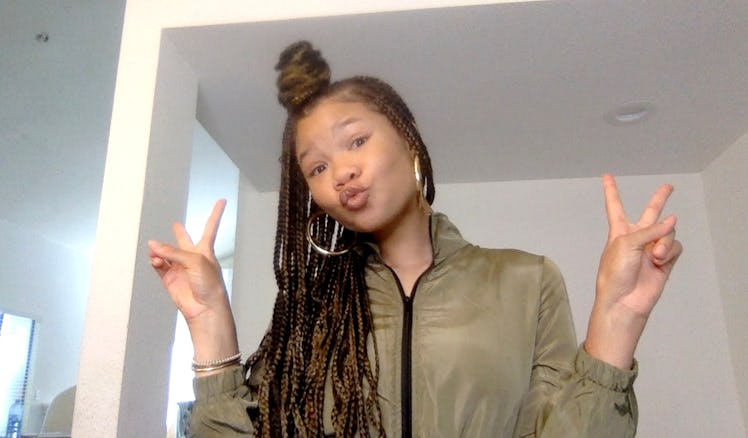
Storm Reid Wants Gen Z Voters To Be Taken Seriously
The 2020 election is going to be a big one for the two youngest generations. This year, millennials are projected to be one of the largest voting demographics in the United States, and Gen Z, with an estimated 24 million eligible voters in 2020, is coming up fast behind them. For anyone with even a casual eye on politics, it should be no surprise that Gen Zers — who are already leading movements on issues like racial justice, climate change, and gun violence — want to be heard at the polls. Actress Storm Reid echoed this sentiment following her appearance at a campaign event for Democratic presidential candidate Joe Biden. "Gen Z is super engaged, and we want to be listened to and understood," she tells Elite Daily.
Reid was one of five panelists at a Women for Biden training on intergenerational conversations about voting, held via Zoom and Facebook Live on Thursday, Sept. 10. The event invited women from younger generations — millennials and Gen Z — to speak with a baby boomer moderator about how to approach conversations about voting, while a millennial moderator did the same for three panelists from the baby boomer and silent generations. Reid, 17, was the representative for Gen Z.
"I think there is a negative perception that young people don’t care about what’s going on in the world, but I believe that’s completely false," Reid tells Elite Daily. Beyond joining the Thursday night campaign event, Reid has previously spoken out publicly about racism and racial healing and posted calls to action against racism to her Instagram. "We have ideas, opinions, and, most importantly, a lot of us are socially engaged and want change for our global community," she says. "If I had to say one thing to the older generations, I would say, please listen to us."
Tina Tchen, the president and CEO of Time's Up and a speaker from the baby boomer generation at the event, also highlighted why conversations and listening are so important. "One of the things we know about voter registration and getting out the vote is that, no matter how much phone banking we do — and I’m a big phone banker too — but the reality is, people will listen to people that they know," Tchen said at the training. "The most persuasive thing to get people to … go out to vote, is by listening to people they know."
Per the Pew Research Center, millennials and Gen Z together will make about 37% of eligible voters in 2020, giving these two youngest generations, who have a lot in common politically, a hefty impact on the political scene. Of that, about 10% of eligible voters in 2020 will be Gen Zers, a pretty substantial shift from 2016, when that generation only made up about 4% of the electorate. Even with the majority of the generation still too young to vote, Gen Z has been making their voices heard. Teens and early 20-somethings have been leading activists on movements like racial justice, gun safety, and even voting rights for the elections they still don't have the ability to vote in.
Reid is one of those who's still too young to vote in November, but that just means she's taking action in other ways. Like, for instance, participating in a panel on productive conversations around voting. "I believe young teens who can't quite vote yet but want to voice their opinions can do a lot of things to make their voices heard," Reid says. She suggests pushing your over-18 friends to go vote, and pre-registering to vote so you can cast your own ballot the moment your 18th birthday hits. And of course, "having progressive conversations with your support network about how they are approaching the upcoming election and beyond."
When asked what's the most important issue for her and young soon-to-be-voters like her, Reid gets expansive. "There are so many issues like gun reform that are extremely important to me and so many other young people, but I believe we can't prioritize one thing we want to change. We have to try to tackle all the things we're passionate about," she says. "If we are passionate about things that do affect us globally, then we should have to be willing to be uncomfortable for real change to happen."